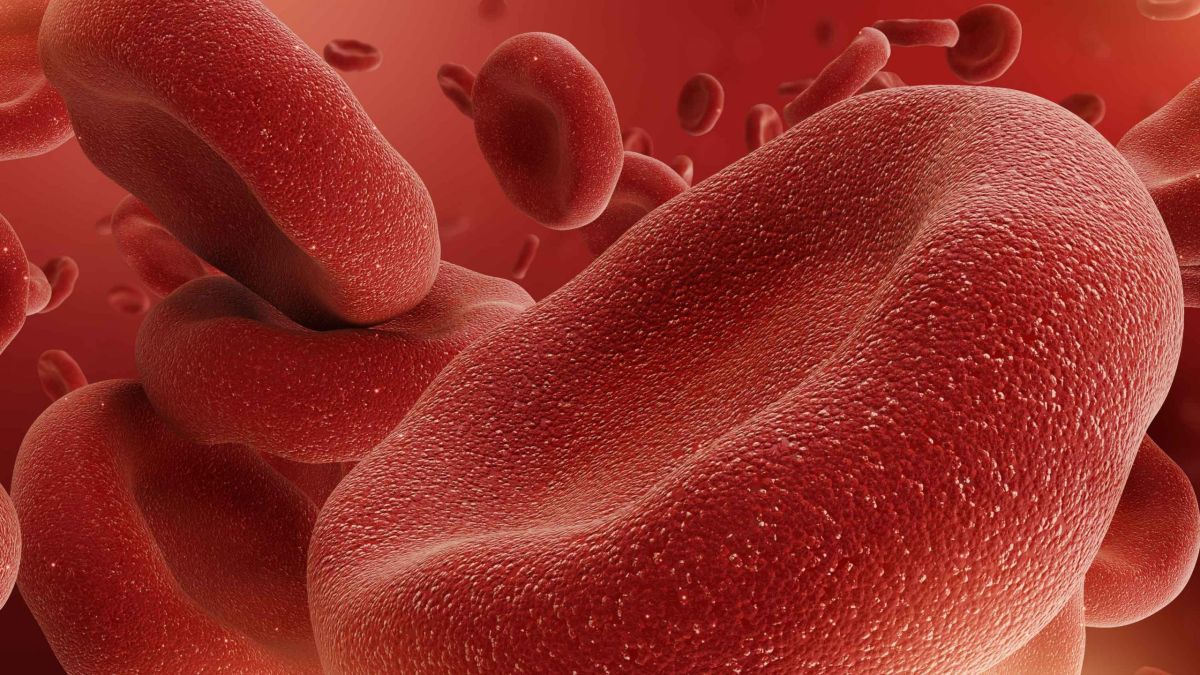Is Blood Considered Impure (Najs)?
Imām Muḥammad ibn Ṣāliḥ al-ʿUthaymīn


Imām Muḥammad ibn Ṣāliḥ al-ʿUthaymīn (d. 1421 AH) said:
The Opinion of the Ḥanbalī Madh`hab
According to the Ḥanabalī madh`hab, a small quantity of blood1 may be overlooked should it drop on a material. The exception to this is if that blood, even a small amount, is to drop onto a solid or liquid substance meant for consumption. Liquid is anything that flows easily like water, milk, or gravy. Examples of solid substances meant for consumption are bread and its likeness. Other than these two classes, a small quantity of blood may be overlooked. So, if a small amount of blood should fall on, for example, a piece of clothing, or on the surface of the skin, or bedding, or the earth or the likeness of these things, it may be overlooked.
As for liquid and solid consumables, even a small amount of blood may not be overlooked. This is the opinion taken by the Ḥanbalī madh`hab.
The Correct Opinion
The correct opinion in this matter is that a small amount of blood is overlooked, regardless of whether it has dropped in a liquid or solid consumable, provided the blood that has dropped is insufficient to change any of the characteristics of that substance.
When referring to ‘blood’ we mean najs blood, not blood that is considered pure. To clarify this, we need to clarify the types of blood. Blood is of three types:
- Blood that is always considered najs or impure.This class of blood is not overlooked should it mar any material even in a small quantity. This is any blood that has come from the genitals or anus. Also, any blood from an animal that is ḥarām for consumption, whose blood flows, like that of a rat or donkey. The blood of a dead animal that is not ḥalāl for consumption except by means of slaughtering is also included in this category [like a cow or chicken that died of natural causes without being slaughtered].
- Blood that is considered najs, but a small quantity of it may be overlooked.This includes the blood of a human being and any animal considered najs when dead. The exception to this is the blood of a martyr which is left on him, musk and its blood vessel [after extraction from the animal], and the blood that is left within an animal after being slaughtered according to Islamic law. All of these are considered pure.
- Blood that is considered pure.These are of different types:
- Fish blood: This is because it is an animal that is considered pure when dead [i.e., fish are not slaughtered]. The basis for ruling dead animals as being ḥarām for consumption is the vascular congestion of the blood within their bodies. For this reason, the blood is allowed to flow during slaughtering, making the animal ḥalāl for consumption.
- Blood that does not flow: For example, the blood of a gnat, bedbug, a fly or similar insects. If one’s clothes is marred by the blood of one of these, the material is considered pure and the person is not obligated to purify it [i.e., he may pray in it without washing that blood]. The evidence of the blood from these types of insects being pure is the saying of the Prophet (صلى الله عليه وسلم): “If a fly falls in one of your drinks, let him dip it in the drink before removing it. For, indeed, in one of its wings there is sickness and in the other there is the cure.”2 Also, dipping the fly will result in killing it if the drink is hot, or if it is oil. Therefore, if dead flies were considered najs, the drink would have to also be considered najs. Especially if the vessel holding the liquid in question is small.
- The blood that is left within a slaughtered animal after slaughtering it: For example, the blood contained within the veins of the animal, its heart, spleen, or liver regardless of whether this blood is abundant or scanty, it is considered pure.
- The blood of the martyr that is found on his body is pure: For this reason, the Prophet (صلى الله عليه وسلم) never ordered the blood of the martyr to be washed. If it was considered najs, he (صلى الله عليه وسلم) would have ordered it to be washed.
Is Human Blood Najs or Pure?
[Q]: Is the blood of the martyr considered pure because it is the blood of a martyr, which is the opinion adopted by the majority of scholars, or is it because it is the blood of a human being?
[A]: According to the majority of scholars, if that very same blood is separated from the physical body of the martyr, it is considered najs.
According to the second opinion, the blood is pure regardless due to it being from a human being. This second opinion that human blood is considered pure, except for what is excreted from the genitals and anus, is a strong opinion. Its evidence is as follows:
- The original state for any substance is pure until evidence proves it impure. We do not know that the Prophet (صلى الله عليه وسلم) ever ordered blood to be washed except for the blood of menstruation. This is in consideration of the frequent occurrences of blood in injuries, nose bleeds, cupping, and other than this. If this blood was najs, the Prophet (صلى الله عليه وسلم) would have clarified this to us due to the clear need for this information.
- Muslims used to pray during battle while being marred by the blood from injuries they had sustained. For some, large quantities of blood would flow from them to the extent that the amount could not be overlooked. Despite this, it was never narrated from the Prophet (صلى الله عليه وسلم) that he ever ordered this blood be washed. Nor was it ever related that they used to try hard to protect or rid themselves of this blood. For example, they never sought to change the blood-stained clothes they were wearing upon finding something other than it. It should not be said that most of the companions were poor and that they could not find any other clothing except that which they were wearing. Especially as they had left their homes, so they could only wear the clothing they had left with as there was a clear need. We would answer this claim by bringing attention to the fact that if the situation was as described, we would have narrations wherein they rushed to clean their clothes as soon as they found a way; either by coming upon water, or arriving back to their town, or the likes of such circumstances.
- The individual parts of a human being are considered pure. For example, a severed human hand is pure even though it contains blood. It may even hold a vast amount of blood. Thus, if an individual part of a human being which is an essential part of his body is considered pure, then it is more befitting that the blood that is separated from that body must also be considered pure.
- Dead human beings are considered pure just like fish. The reason for this is that fish blood is pure such that, when dead, the fish itself is considered pure. Likewise, we can reason that the human blood is pure because their dead body is pure.
[Q]: This qiyās [analogization] is contrary to another which is the fact that faecal matter and urine which are excreted by human beings are considered najs, so their blood must also be najs.
[A]: There is a clear difference between faecal matter or urine, and blood. This is because urine and defecation is widely considered to be detestable, putrid-smelling najs whose avoidance is a natural inclination. You do not seek to analogise blood with such a substance as you claim that a small amount of blood may be overlooked while a small amount of urine or defecation may not be. Thus, the ruling of this must remain unattached to that.
[Q]: Could we not analogise all blood with the blood of menstruation? The blood of menstruation is clearly najs as the Prophet (صلى الله عليه وسلم)) ordered the woman to scratch it off her clothing, then wash it with water, then quench the place with more water before praying in it.3
[A]: There are differences between the two:
- The blood of menstruation is natural, part of the disposition of women. The Prophet (صلى الله عليه وسلم) said: “Indeed, this is something that has been written for the daughters of Ādam.”4 Thus, he (صلى الله عليه وسلم) has clarified that it has been written, pre-ordained among that which must occur for them. However, he (صلى الله عليه وسلم) said concerning the blood of istiḥāḍah [any blood that is excreted outside of the normal time for menstruation]: “It is the blood of a vein.” This shows that he (صلى الله عليه وسلم) differentiated between the two.
- The blood of menstruation is thick, putrid, and has a detestable smell. In this way, it is similar to urine and faeces. It is, therefore, incorrect to analogise blood that leaves the body from the anus and genitals with blood that does not. Blood that is excreted from the anus and genitals is inclusive of the blood of menstruation, istiḥāḍah, and nifās [post-delivery].
Considering this, the opinion that human blood is considered pure is strong as it is supported by evidence and analogization.
As for those who claim it to be najs but that a small quantity may be overlooked, they have issued two rulings here:
- human blood is najs,
- but a small amount may be overlooked.
Both of these rulings require evidence.
We say to them: Firstly, confirm that blood is actually najs then confirm that a small amount may be overlooked. This requires evidence because the original state for anything that is considered najs is that a small amount of it may not be overlooked [as is the case for urine and faeces]. As for those who claim that it is pure, they only require a single piece of evidence to support it being pure. These evidences have already been mentioned.
[Q]: Fāṭimah (رضي الله عنها) cleaned the blood from the Prophet (صلى الله عليه وسلم) during the conquest of Uḥud. Therefore, this proves that blood is najs.
[A]: The answer is in two parts:
This is just an action. As such, it alone cannot be used to prove obligation.
There is a possibility that she only did so for the sake of cleanliness. As she cleaned the blood from his (صلى الله عليه وسلم)’s face. No person would be pleased to have blood marring their countenance, even if it was only a little. This possibility detracts from the use of this situation as evidence.
Endnotes:
[1] Translator note: For clarity, the ‘blood’ being referred to here is najs blood like the blood of menses, or any blood that leaves the body from the anus or genitals. This is further elucidated later on in the article.
[2] Authentic: narrated by al-Bukhārī: 3320.
[3] Authentic: narrated by al-Bukhārī: 227 and Muslim: 291.
[4] Authentic: narrated by al-Bukhārī: 294 and Muslim: 119
Source: Al-Sharḥ al-Mumtiʿ 1: 438-443
Translated by: Riyāḍ al-Kanadī

















